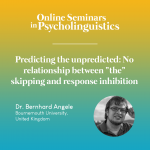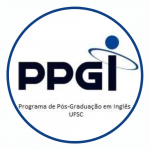4th Online Seminars in Psycholinguistics
Divulgamos o quarto Online Seminars in Psycholinguistics, evento organizado pela professora Mailce Mota (PPGI/UFSC).
The Language and Cognitive Processes Lab (LabLing/UFSC) and the Bilingual and Multilingual Language Processing Research Group (Plibimult/UFC) would like to invite you to the Online Seminars in Psycholinguistics, a series of videoconferences related to language learning and processing.
The 4th videoconference of the series will be presented by Prof. Dr. Bernhard Angele (Bournemoth University, UK), on July 23 2020, at 1 pm (Brasilia time). The talk will be streamed live on PPGI Youtube channel and you can use the chat to post your questions and comments.
Certificates will be available for each videoconference. Information about certificates will be given during the talk.Predicting the unpredicted: No relationship between “the” skipping and response inhibition
Dr. Bernhard Angele (Bournemouth University, UK)
https://staffprofiles.bournemouth.ac.uk/display/bangele
Skilled readers are likely to skip short, high-frequency words such as “the” in English. When deciding to skip such words, readers fail to take into account the preceding sentence context and will frequently skip an upcoming word that looks like “the” even if it is incompatible with the context, i.e. infelicitous (Angele & Rayner, 2013). It is not clear if (1) this failure to identify a potential problem with a sentence stems from an inability to access the information about the sentence context at the point of making the skipping decision or (2) a problem in selecting the appropriate information in order to make the decision. The latter case resembles response inhibition tests where participants need to make a decision in the presence of incongruent stimuli. If skipping and response inhibition depend on the same cognitive processes, we should find a relationship between a participant’s performance on response inhibition tests and the rate at which they skip words with an infelicitous gaze-contingent preview. We report an experiment testing this hypothesis in which there was no evidence for a relationship between the congruency effect in response inhibition tests and the rate of skipping infelicitous previews in a sentence reading task.
Bio
Dr. Bernhard Angele obtained his MA degree (in 2009) and a PhD degree on parafoveal processing in reading (in 2013) from the University of California San Diego. His research interests primarily focus on eye movements during skilled adult reading and language processing. Specifically, he has been studying the effect of parafoveal preview on processing and reading performance. In his research, he uses eye-tracking to study how readers process words and sentences, and how attention is allocated in this process. His current research focuses on a few topics: computational modeling, saccade targeting during reading, auditory distraction, and parafoveal processing. He is also interested in statistical inference in psychology, evidence synthesis, and the philosophy of probability.








